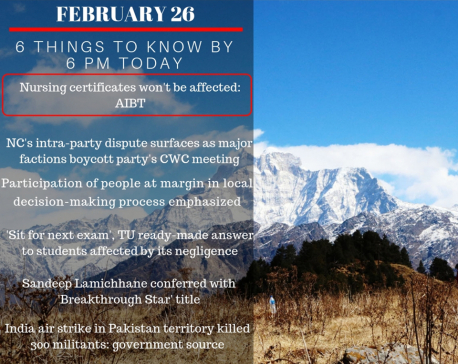
OR
AIBT Controversy
‘Stakeholders were aware of vulnerable status of AIBT’
Published On: February 28, 2019 09:02 AM NPT
KATHMANDU, Feb 28: It has been learnt that stakeholders in Nepal had been sending students to the Australia Institute of Business and Technology (AIBT) despite being aware that the institute was in critical state under the L3 category, which means which means it performed bad in last consecutive three years.
According to Ishwar Dhakal, managing director of Maple International Education, the offer letter issued by AIBT to the students was marked with 'accreditation is in the process'.
What's surprising is that the Ministry of Education, Science and Technology (MoEST) and Australian High Commission, New Delhi remained silent while students were being sent to such a vulnerable institute.
“If its condition was so pathetic, why did the education consultancies send the students there? Why did the students accept such offer letters and the MoEST issued 'no objection certificate' and the Delhi-based Australian High Commission issued visa for enrollment of students in the ailing AIBT?” said officials at Maple International Education as well as Oli & Associates, which facilitate sending students to Australia.
These two consultancies claimed that they didn't send students to AIBT. MoEST officials say that there might be around two dozen consultancies that might have sent Nepali students to AIBT. There are more than 2,000 education consultancies across the country.
Dolphin Education Consultancy is one of the consultancies that sent students to AIBT. Representatives of the consultancy, which claimed only one student was sent to AIBT, said they have learnt a lesson from this.
Officials at Maple International Education revealed that the consultancies get more commission from private colleges than universities in Australia.
“While a university offers AUD $2,000 to the consultancy, it charges AUD $ 15,000 as fees for a student. But a college offers AUD $3,000 to a consultancy per student even though it charges AUD $ 10,000 per student,” they said. “AIBT is one of the colleges that offers higher commission to the consultancies.”
On February 20, the Australian authority cancelled the accreditation of AIBT, where Nepali students have been enrolled, for not maintaining its practices as per the rules.
According to the MoEST, over 66,000 Nepali students have been given no objection certificates to study in Australia in the last 18 months. Out of 2,000 overseas students enrolled at AIBT, about 50 percent are Nepalis, according to the AIBT officials.
The issue became public only after more than 800 overseas students enrolled in the Diploma of Nursing course at the AIBT were told that their degrees would not get due recognition as the course did not get accreditation from the Australian Nursing and Midwifery Accreditation Council (ANMAC) .
The Australian Skills Quality Authority (ASQA) said the decision to cancel AIBT's Vocational Education and Training Accreditation and the Commonwealth Register of Institutions and Courses for International Students or CRICOS registration was based on the institute's failure to demonstrate that its marketing practices were accurate and factual, according to Australian news portal SBS.COM.AU.
On February, 21, Australian Embassy in Kathmandu issued a statement, saying that the institute is permitted to continue operating, including conducting classes, until the authorities take a decision on a review petition filed by AIBT.
The Embassy advises that any student studying at AIBT should remain enrolled and continue to attend classes, to ensure that the conditions of their visa are met and their recourse to the Tuition Protection Service is assured should the provider cease delivering its courses.
You May Like This

Australian TV journalist who met with Rita Wilson has virus
An Australian television journalist said Monday he has the new coronavirus and assumes he contracted it while meeting with actress-singer... Read More...

At least 4 dead in shooting in Australian city of Darwin
MELBOURNE, June 4: A gunman was arrested after killing at least four people and wounding several others Tuesday in the... Read More...

Feb 26: 6 things to know by 6 PM today
Your daily dose of missed important news of the day. ... Read More...





Just In
- NRB introduces cautiously flexible measures to address ongoing slowdown in various economic sectors
- Forced Covid-19 cremations: is it too late for redemption?
- NRB to provide collateral-free loans to foreign employment seekers
- NEB to publish Grade 12 results next week
- Body handover begins; Relatives remain dissatisfied with insurance, compensation amount
- NC defers its plan to join Koshi govt
- NRB to review microfinance loan interest rate
- 134 dead in floods and landslides since onset of monsoon this year












Leave A Comment